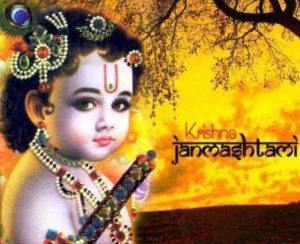It’s the birth anniversary of the most popular, lovable and charming cowherd of Varanasi. Disciples of Lord Krishna are in deep festive spirit. With overwhelmed positivity in the mind and heart everyone is on fast. The voice quality of speakers in homes is being tested with the collection songs dedicated to Krishna and the greatest music lovers of Patna which is the auto-drivers will surely play the latest collection. Basically, this whole week will be coloured with the Krishna-Radhe bhajan.
The markets are flooded with various items like tiara, swings, dresses, peacock feather and idols. Lot of readymade things are available in the market which is required in the rituals. A vendor in the Digha Market said “Festivals like this are the only opportunity for us to do business otherwise no one buys these idols. This is the way how god blesses us.”
The celebration cannot over without breaking the pots filled with curd. Yes, the Dahi Handi is another joyful part of the festival. Lord Krishna was known as Makkhan Chor because he would steal milk products so her mother used to hang the pots. Dahi Handi is based on it. A group of young men and boys make a human pyramid and attempt to break the pot hanging up at height.
Everyone is energised for Janmashtami because this is one of the vibrant festivals of Hindus. They have got themselves busy for the puja and forming groups for Dahi Handi. Some people are concerned about rain on Janmashtami because it always does rain.
Deedar
……….
Krishna Ashtmi, also known as Janmashtmi is the festival, in which Hindus celebrate the birth of Sri Krishna. It gets celebrated on the 8th day of Krishna Paksha, Bhadra month according to the Hindu luni-solar calendar.
After Raksha Bandhan, in the market, Janmashtami purchasing started. In Patna, many temples will be decorated in an exclusive way . A Krishna procession take place aling some of the main streets.
So many things are available in the market for decoration of Krishna Janmastami like ‘Vrindavan ki pagri’, ‘Rajkot ka jhula’ it is showing the happiness.
Devotees celebrate this festival by doing upvas (Fasting), Jagran (Night Vigil), Bhajan-Kirtan etc. Since Krishna took birth in Mathura-Brindawan, and that place is called the Janmnagri. That’s why this festival is celebrated there with more enthusiasm and in a grand way. In other cities people celebrate the birth of Krishna in different ways. In Maharashtra they play Dahi-handi, in other places the day celebrated by doing dance-drama (Krishnlila).
Nowadays, the youth of India also celebrate this festival in very grand way, the girls do fasting for the entire day, and in night by 12 when it is supposed to believe that Krisna took birth, they celebrate by worshiping him.
Other side boys celebrate it in very enthusiastic way, they do all kinds of fun things, they play Dahi-handi in which a group of boys make human pyramid, and on the height the matki (earthen pot) full of yogurt is being hung with the help of rope or pole, and then the boys try to break the pot. These boys basically known as Govindas. In many places this Dahi-handi is a competition which held on the same day of Janmashtmi.
Krishna Janmashtmi is the festival which is all about celebration, enthusiasm, excitement and fun. This is the festival, which is celebrated by all the generation in their own specific way, doesn’t matter what is the age group, it is celebrated by all with the equal energy. There is no physical boundary.
People celebrate this festival over two days at temples, home and community center. A fast is kept by the devotees 24 hours prior to celebration that begins at midnight. The occasion is marked by placing a statue of the lord Krishna and bathing in panchamrit made up from milk, honey, ghee, tulsi leaves and Gangajal.
This Panchamrit is distributed as Prasad to the devotees.
As legend the goes, the special festival food constitutes Krishna’s favourite dishes and usually includes cereals, fruits, dry fruits, sweets,  drinks, namkeen and pickles in quantities of eight under each category. Some of the common items which are found in the bhog are Makhan Mishri, kheer, rasgulla, jalebi, rabri, mathri, malpua, mohanbhog, chutney, murabba, saag, dahi, Khichadi, tikkis, milk, cashews etc. Even if devotees are not able to put together a chappan bhog for their lord, Makhan Mishri is a staple bhog, which is usually always offered to the deity on Janmashtami.
drinks, namkeen and pickles in quantities of eight under each category. Some of the common items which are found in the bhog are Makhan Mishri, kheer, rasgulla, jalebi, rabri, mathri, malpua, mohanbhog, chutney, murabba, saag, dahi, Khichadi, tikkis, milk, cashews etc. Even if devotees are not able to put together a chappan bhog for their lord, Makhan Mishri is a staple bhog, which is usually always offered to the deity on Janmashtami.
It is said that this festival shows the relationship, trust and faith between the god (Krishna) and his devotees.
Yogi


